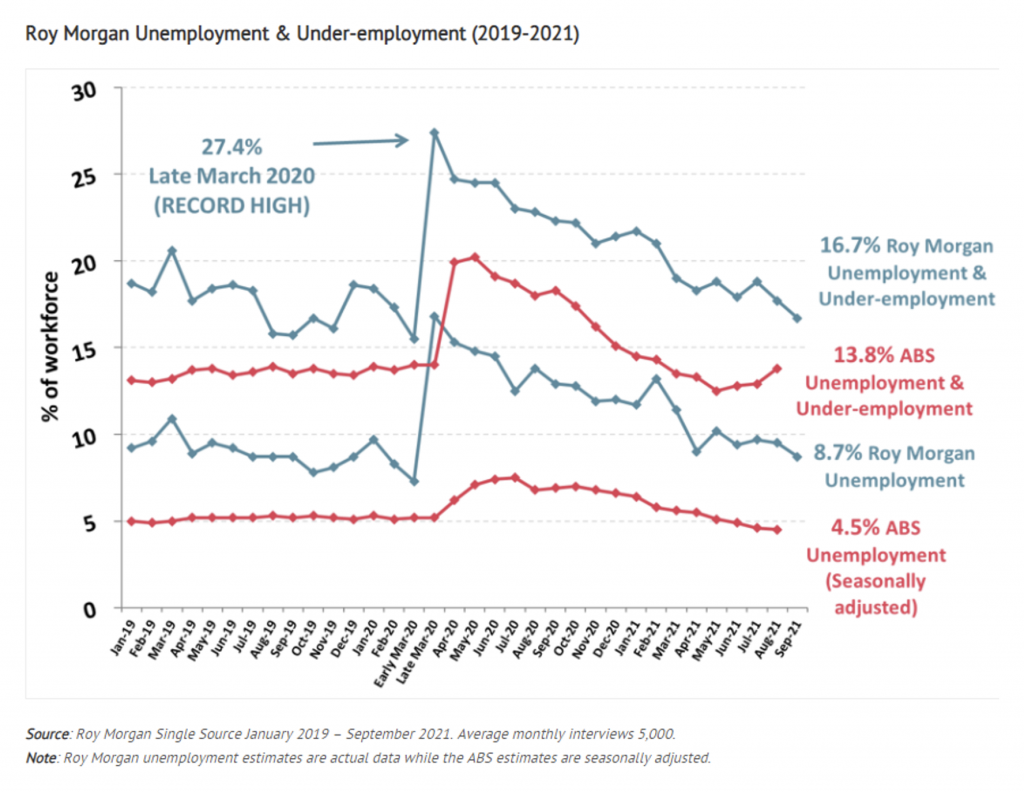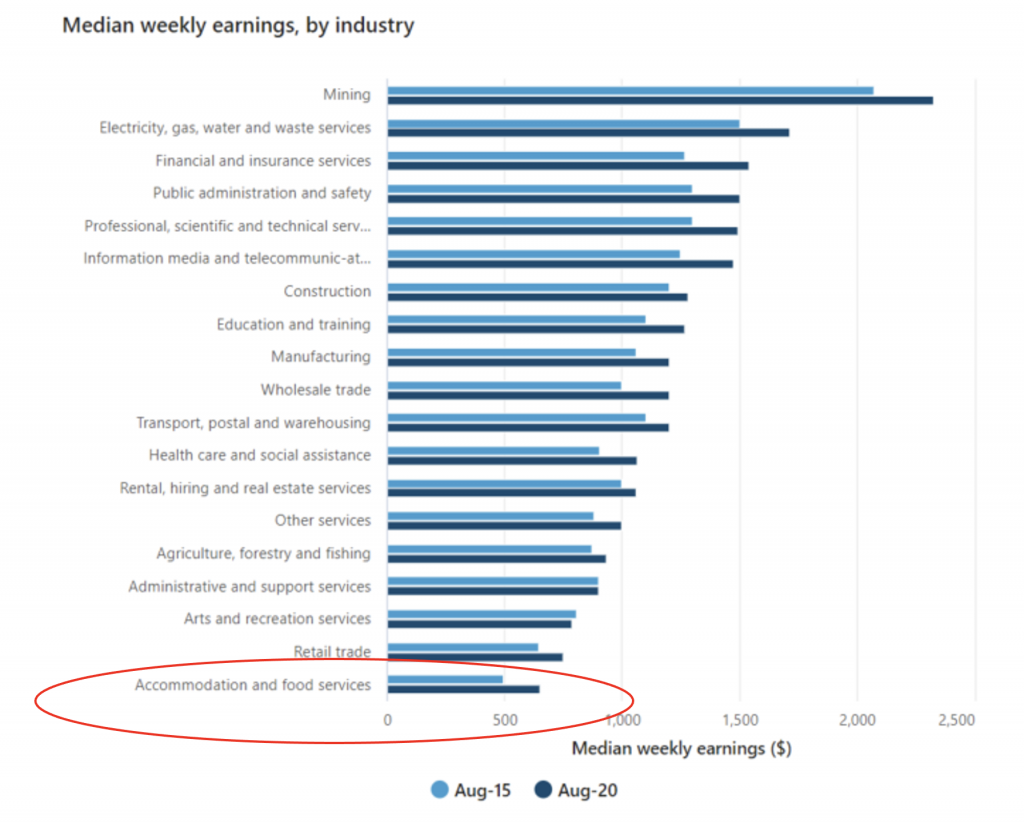
Should we import cheap foreign workers, or pay locals more?
The reliance of many Australian industries on cheap imported labour is highlighted by a recruitment drive currently underway in the UK to entice 500 hospitality workers with the promise of free flights, drinking and dining vouchers, and paid hotel quarantine. But is this reliance on foreign workers in the national interest? Or, given the high unemployment rate, would it be better to attract local workers by paying them more?
The hospitality industry has been particularly hard hit by the last 19 months’ travel restrictions and lockdowns with no inbound tourism and regular dips in domestic tourism and hospitality consumption as people have been confined to their homes and not able to go out to restaurants and pubs etc.
A lot of Australian hospitality workers are unemployed or severely under-employed and the important question for the industry is what will happen when the borders open up and we start to see inbound tourism again. Will there be enough workers to handle the increased volumes or will there be a staff shortage?
A big risk is workers who have seen themselves without work have retrained into other careers and will not go back to hospitality again once positions become available. The picture is further complicated by the fact that a large portion of workers in the past were temporary holiday makers working seasonal jobs, where needed, and we do not know if they will come back again to the same extent and at the same pace as general tourism returns.
The hospitality industry seems to think that this will be the case and it seems like at least one operator has started a recruitment drive in the UK to recruit 500 hospitality workers with the promise of a “$1,000 drinking and dining voucher” with free flights to Australia, paid hotel quarantine and two weeks free accommodation, as described in this article where they are even talking about potential charter planes to bring in UK workers.
This seems like an interesting strategy given the recent Roy Morgan Unemployment and Under-employment survey shows that 16.7 per cent of the working population are either unemployed or under-employed, which would, even though it is back down to pre-pandemic levels, indicate that there should be plenty of people to fill an increase in demand for hospitality jobs.
So why is the hospitality industry looking to import foreign labour at a high upfront cost when it seems like they should be able to attract local labour by instead using the money it would cost to entice the foreign labour to come here on higher salaries for locals?
The answer for this is the industry does not want to set a precedent and permanently lift the wages paid to workers. And is instead preferring to spend this one-off money and hope that the situation will go back to normal over time. After all, the hospitality industry is by quite a margin the lowest paying industry in Australia as the chart below from the ABS shows:
Source: ABS
An industry that is so heavily reliant on cheap imported labour will continue to be very vulnerable to external events and is clearly not sustainable in its current form and needs some structural reforms. The same can also be said for quite a few other industries reliant on cheap imported labour – like agriculture in particular – as I have previously argued.
Here at Montgomery, we are staying away from investing in companies in this sector because we think the industry will have to reform itself and this will likely have unpredictable effects that can significantly impact profitability before the structural reforms are done.
You can read my previous articles on this below:
Is it time for companies relying on cheap foreign labour to rethink their business models?
Why our dependence on backpacker labour may need to change
Which businesses could lose out if migrant numbers are cut?
This post was contributed by a representative of Montgomery Investment Management Pty Limited (AFSL No. 354564). The principal purpose of this post is to provide factual information and not provide financial product advice. Additionally, the information provided is not intended to provide any recommendation or opinion about any financial product. Any commentary and statements of opinion however may contain general advice only that is prepared without taking into account your personal objectives, financial circumstances or needs. Because of this, before acting on any of the information provided, you should always consider its appropriateness in light of your personal objectives, financial circumstances and needs and should consider seeking independent advice from a financial advisor if necessary before making any decisions. This post specifically excludes personal advice.
INVEST WITH MONTGOMERY

As a first generation, self funded (international student) migrant here, who pays tax, took citizenship, runs my own business and portfolio, and still calls Australia home for 21 years, I’ll tell you why Ron.
It’s because the inconvenient truth is that there are a LOT of “job shy”, “home grown” Australians, a.k.a. “Lozies”, who don’t want to do “the bad jobs” like chicken boning in a slaughterhouse, but there are a lot of people who do. Why ? Because they are willing to work hard and potentially get residency here after doing the hard yards on a temporary visa (never knowing if you’ll have to leave your life here), to get a better standard of life for themselves. We’re willing to take that gamble.
This is no different to America, where Mexicans are (legally) bussed in every day to pick lettuce in Yuma, AZ. Why ? Because Americans won’t do it, the work is too hard and the pay is too little. Bit different to the Depression, when people went West and took ANY sort of work because it paid or they got food !
Migrant workers are some of the hardest ones you’ll get, because we’re hungry for success. We have to start all over again, at the bottom of the heap. We have to work harder than the ‘home growns’ because we have to prove ourselves amongst them, and to get ahead, so we work longer hours and take on the ‘bad jobs’ they don’t want to do without complaining about it. Indian IT workers are the best because culturally, they know that “if you do a good job, you use that as a springboard to get up onto the next, better one”, that’s why they work so hard and are the best coders, in my experience.
Have you ever had a Chinese meal Ron ? An international student was probably your wait staff or cooked it for you. Ever caught a taxi on the way home from it ? That was probably another student who will one day, be an engineer or a doctor, or someone that will start their own business because from my experience, most Australian SMEs won’t give them a fair go and instead, will just throw their application for a job in the “too hard basket” when they see the word “visa”, then complain they can’t get staff. That’s why.
Spot on as usual Andreas. I have given up understanding why we depend on temporary overseas labour (including overseas students who are supposed to be paying their tuition with foreign funds instead of earned A$) when we have so many underemployed people. So a cup of coffee may have to rise by 20c.